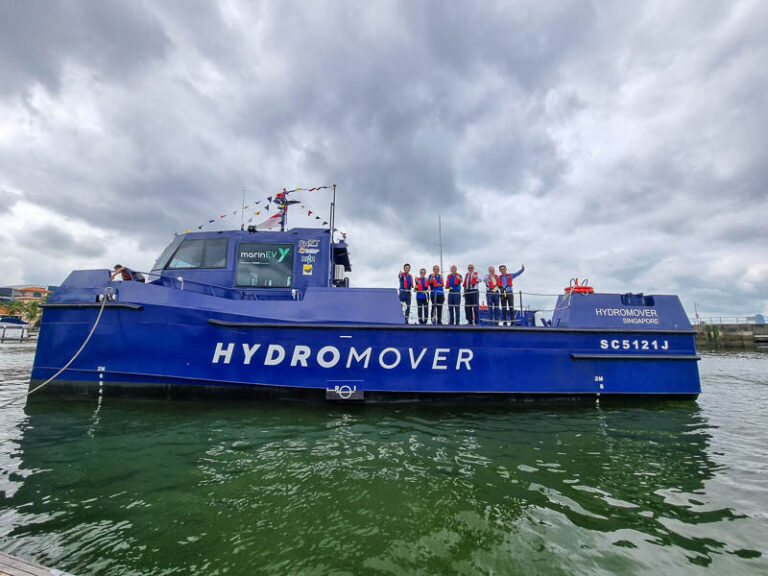The Goal Zero Consortium, comprising companies such as SeaTech Solutions International (S), Shift Clean Energy, and Yinson GreenTech, has launched Singapore’s first fully electric cargo vessel, the Hydromover.
The Technology Centre for Offshore and Marine, Singapore (TCOMS), and the Singapore Institute of Technology assisted in the engineering and construction plans of Hydromover, which will be classed by RINA Hong Kong Limited Singapore Branch.

The milestone launch was revealed by the CEO of the Maritime and Port Authority (MPA) of Singapore, Eng Dih Teo, saying that more electric vessels are expected to ply Singapore’s waters in the coming months.
The news was confirmed by YGT, who said that the Hydromover was the first project ready for commercial testing, putting it in a “advantageous position in the commercialization and innovation space”.
There were five potential partners who have provided letters of intent to charter the Hydromover for operational trials, with the view to electrify their fleets in the future. These are two Goal Zero partners Lita Ocean and DM Sea Logistics, as well as OPL Services, RW Marine Services, and Tian San Shipping. The five parties’ combined fleet stands at over 150 vessels, marking significant potential for future conversion to electric vessels.
The lightweight, 18.5m vessel is equipped with swappable batteries, allowing it to transport up to 25 tonnes of cargo.
The vessel, being all-electric, has zero emissions and targets to achieve up to 50% operational cost savings due to improved energy efficiency and lower maintenance costs. Its battery, when depleted, can be swapped within minutes to minimize operational downtime.
This electric cargo vessel can operate at 8-10 knots, covering up to 40 nautical miles at half load. It boasts several efficiency features, including a catamaran aluminum hull for reduced drag, lightweight components, solar panels, azimuth thrusters for swift directional changes, and swappable high-energy-density batteries.
The introduction of swappable batteries allows the Hydromover to minimize operational downtime, making it more productive than conventional harbourcraft. With reduced downtime, a smaller fleet can accomplish the same amount of work, leading to enhanced productivity and reduced operating costs over the vessel’s lifetime.
The Hydromover will serve as a ‘living lab’ for YGT and Goal Zero’s R&D partners including SIT, and TCOMS, which are working on a holistic digital twin of the vessel. This will facilitate research on the combined effects of variables such as vessel hydrodynamics, propulsion, motor dynamics and battery performance, allowing ship designers and operators to enhance operational efficiency and safety.
The MPA, in alignment with its decarbonization efforts, is mandating all harbor craft to transition to fully electric, capable of using biofuels or being compatible with net-zero fuels like hydrogen by 2030. This move aims to not only cut emissions significantly but also brings various benefits such as lower maintenance, increased energy efficiency, and reduced noise pollution.


